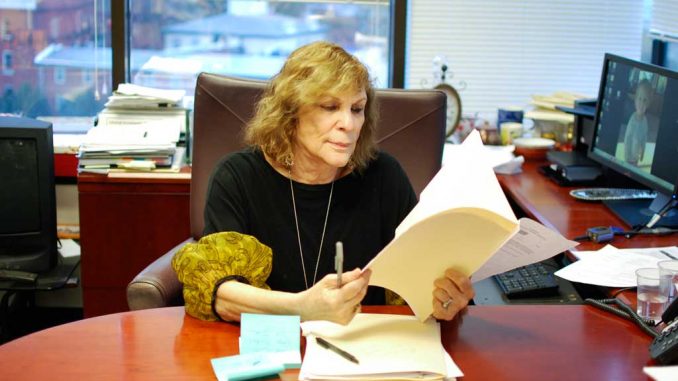
In front of her window overlooking the Center City skyline, Edna Foa has a picture of one of her many honors. Four skyscrapers, each one lit up as if in celebration of sports championship, spell out “WOAR Honors Edna Foa.”
The tribute downtown is just one of many notable honors Foa has received in her more than 40 years researching the psychology of anxiety disorders.
However, as Foa puts it, she has never received an award celebrating her role as a teacher, in fact, she said she never thought of herself as a teacher in a formal sense.
For Richard McNally, another award-winning psychologist at Harvard University, Foa was more than just a teacher, she has been both a mentor and colleague for more than 30 years since their days working together at Temple. McNally recently honored Foa by nominating her for a major cash award for her work.
In September 1982, McNally began working as an intern at the Temple Department of Psychology’s Behavioral Therapy Unit in the Eastern Pennsylvania Psychiatric Institute, under the clinical supervision of Foa.
Foa, who was born in Israel and received her Ph.D. from the University of Missouri, was studying personality disorders in adults and their relation to human memory. Foa and McNally conducted experiments while working at Temple, having patients memorize groups of words while in a mood state such as depression and later repeat those words while they were in a normal state and in their mood. The psychologists would try to find if there was a link between mood disorders and memorization.
After one year, McNally became Foa’s first post-doctoral fellow, and continued working under her direction until August 1984 when he left to become an assistant professor at the University of Chicago.
“[McNally] is a genius,” Foa said. “He was very energetic…Everyone was partying and we were on the side writing papers.”
While the pair’s time working together at Temple was short-lived — Foa also left to join the Medical College of Pennsylvania and then the psychology department at the University of Pennsylvania — they would spend the next 25 years collaborating on ideas, working on experiments and co-writing papers and grants to further knowledge on the effects of anxiety disorders in society.
“She influenced me theoretically as a researcher and as a clinician. When I established my Anxiety Disorders Clinic in 1986, I featured [Foa’s] innovative intensive exposure and response prevention treatment for OCD. This program is very effective, and my clinic was the only one in the Chicago area — a region comprising about six million people — to offer [Foa’s] program,” McNally said in an email.
McNally’s anxiety disorder clinic, which used a sliding fee scale to assist poorer members of the community, became an inspiration for a few of McNally’s own students who set up similar centers in San Diego and Wisconsin.
In 1991, McNally moved to Harvard where he is now a director of clinical training for the Doctoral Psychology Program and head of the McNally Lab, which studies anxiety disorders.
In her own work, Foa began focusing on post-traumatic stress disorder, specifically its role on soldiers returning from war and how the military can treat such disorders. For her development prolonged exposure therapy to combat-related PTSD, Foa was honored as one of TIME’s 100 Most Influential People in 2010, an award she first thought was a joke.
“I thought it was junk mail, I was going to delete it,” Foa said.
Two years later, Foa received another letter about an award that caught her by surprise, congratulating her for inspiring McNally to make a significant difference in the community.
“I wrote him and I said, ‘I won some kind of award and it is called the Beckman Award, did you nominate me for it?’” Foa said.
McNally had nominated her for the $25,000 Elizabeth Hurlock Beckman Award Trust, which was presented to Foa in Atlanta on Saturday, Nov. 10. The award trust was founded in 2008, and is given to college instructors who are nominated by former students for inspiring their contributions to society.
“[McNally] is a major figure in psychology in general, and clinical psychology in particular, and he himself inspired many people in different areas,” Foa said, adding that within his field, McNally is sometimes viewed with controversy. “He likes to raise difficult questions, ethical and moral issues, as well as professional issues, so I don’t think in the area of clinical psychology there is a person who doesn’t know his name.”
Beyond their professional ties, McNally and Foa both said they have maintained a close personal relationship throughout the years. Both attended the award ceremony in Atlanta during the weekend, where they also met with their spouses for dinner. Next week, both will be attending and speaking at the 46th Association for Behavior and Cognitive Therapies Convention in National Harbor, Md., a continuation of their decades of work that began together at Temple.
While the Beckman Award will be one of many decorating Foa’s office at Penn, for her the award carries a special meaning — her first in the area of teaching and nomination by a friend.
“Well it’s always nice to be nominated for an award,” Foa said. “Especially for this one.”
John Moritz can be reached at john.moritz@temple.edu or on Twitter @JCMoritzTU.


Be the first to comment